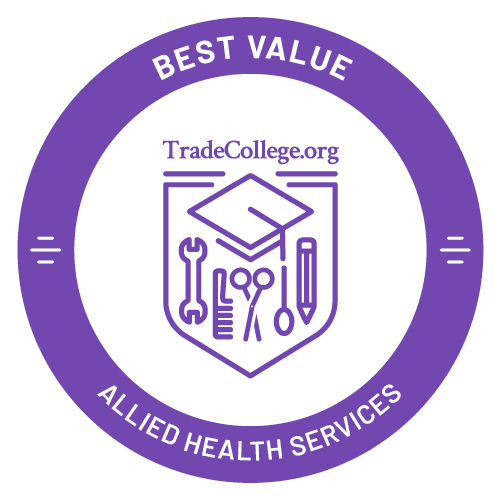2023 Best Value Allied Health Services Undergraduate Certificate Schools in North Dakota
Identifying Quality Schools at More Affordable Prices
Finding the Best Allied Health & Medical Assisting Services Undergraduate Certificate School for You
With 29 degrees and certificates handed out in 2021-2022, allied health & medical assisting services is the #18 most popular major in North Dakota.
With all the trade school programs available today, it can be tough to choose which one is the best for you. Along with traditional schools that require in-person attendence, you can attend one of many reputable online schools. Some programs even offer a hybrid experience.
To help you arm yourself with the information you need to make your decision, Trade College Search has developed this Best Value Allied Health Services Undergraduate Certificate Schools in North Dakota ranking. Our analysis looked at 2 schools in North Dakota to see which undergraduate certificate programs offered the best value experiences for medical assisting students with the aim of identifying those quality schools that are more affordable than some of their counterparts.
Our ranking of value is based on the quality of a program as defined in our per sticker price dollar. More specifically, we discount our quality score by the published tuition and fees charged by a school. This gives the cost per unit of quality for each college. The value is determined by how much quality your dollar buys.
In our regional and nationwide rankings, out-of-state tution and fees are used in our calculations. Average in-state tuition and fees are used for our statewide rankings.
Featured schools near , edit
2023 Best Value Allied Health & Medical Assisting Services Undergraduate Certificate Schools in North Dakota
Check out the medical assisting undergraduate certificate programs at these schools if you want to get the best value for your educational dollar.
Best North Dakota Schools for Affordable Quality for an Award Taking 1 to 4 Years in Allied Health Services
Our 2023 rankings named Dakota College at Bottineau the best value school in North Dakota for allied health & medical assisting services students working on their undergraduate certificate. Located in the remote area of Bottineau, MSU-Bottineau is a public college with a small student population.
The average tuition and fees for an in-state undergraduate at MSU-Bottineau are $5,347 a year.
Full Allied Health & Medical Assisting Services at Dakota College at Bottineau Report
The excellent undergraduate certificate programs at North Dakota State College of Science helped the school earn the #2 place on this year’s ranking of the best value allied health & medical assisting services schools in North Dakota. North Dakota State College of Science is a small public school located in the town of Wahpeton.
In-state tuition fees for undergraduate students at North Dakota State College of Science are $5,880 per year.
North Dakota State College of Science also took the #4 spot in our Best Allied Health Services Undergraduate Certificate Trade Schools in North Dakota rankings.
Best Value Allied Health & Medical Assisting Services Colleges in the Plains States Region
Explore all the Best Value Allied Health & Medical Assisting Services Colleges in the Plains States Area or other specific states within that region.
| State | Degrees Awarded |
|---|---|
| Kansas | 945 |
| Missouri | 862 |
| Minnesota | 1,014 |
| South Dakota | 123 |
| Iowa | 477 |
| Nebraska | 208 |
Majors Related to Medical Assisting
Allied Health & Medical Assisting Services is one of 11 different types of trade school programs to choose from.
Medical Assisting Focus Areas
Most Popular Majors Related to Medical Assisting
| Related Major | Annual Graduates |
|---|---|
| Health & Medical Administrative Services | 88,600 |
| Practical Nursing & Nursing Assistants | 85,339 |
| Allied Health Professions | 83,905 |
| Health Sciences & Services | 36,762 |
| Mental & Social Health Services | 30,331 |
Notes and References
*These averages are for the top 2 schools only.
- The Integrated Postsecondary Education Data System (IPEDS) from the National Center for Education Statistics (NCES), a branch of the U.S. Department of Education (DOE) serves as the core of the rest of our data about colleges.
- Some other college data, including much of the graduate earnings data, comes from the U.S. Department of Education’s (College Scorecard).
More about our data sources and methodologies.
Featured Schools
 Request Info
Request Info
|
Southern New Hampshire University You have goals. Southern New Hampshire University can help you get there. Whether you need a bachelor's degree to get into a career or want a master's degree to move up in your current career, SNHU has an online program for you. Find your degree from over 200 online programs. Learn More > |


